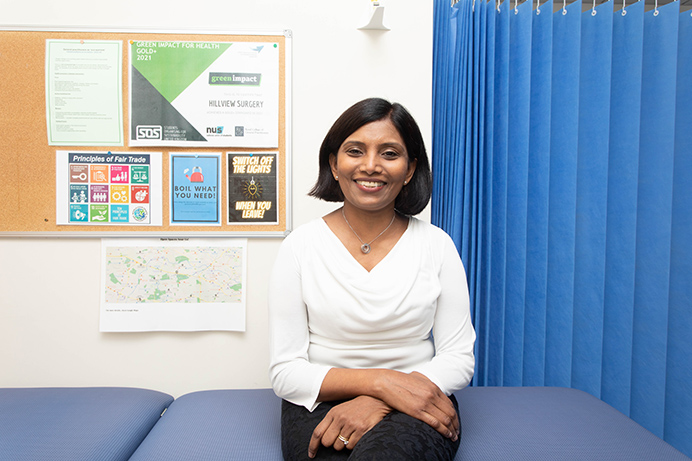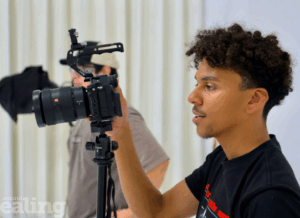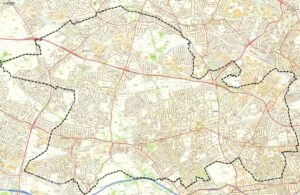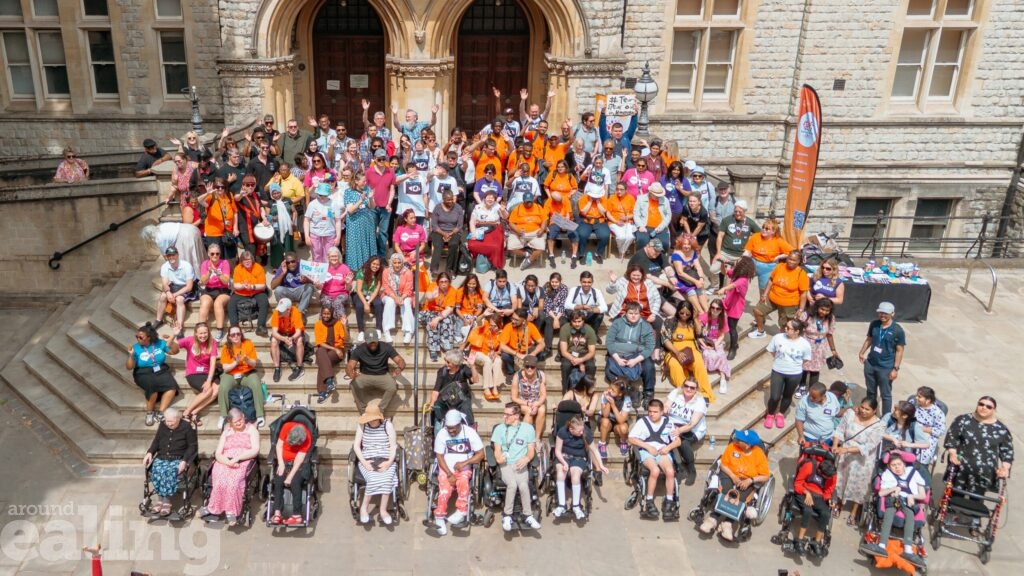A local GP, who is one of Ealing Council’s local climate leaders, has put together a top 10 list of tips of things we can all do in our day-to-day lives to help our own health – and that of the planet, too.
Dr Vasu Siva, who is based at the Hillview Surgery in Perivale, said: “According to the World Health Organisation, climate change is currently the most significant risk to human health worldwide. It is affecting clean air, safe drinking water, sufficient food and secure shelter. It threatens the foundation of good health and widens health inequalities.
“What is good for us is good for our planet, too. Small positive behavioural changes will impact our environment and our planet so that we have a healthier, safer and happier place to live. It is a win-win solution.
“I put together some evidence-based, simple and practical tips that we can all follow in our everyday lives.
“Every one of us have a responsibility towards contributing to mitigating climate change, however small it may seem. Small, positive actions lead to bigger actions. Every positive change made will bring benefits to the individual, families, society and our planet, both current and future generations. Together we can make a difference.”
Jump to tips:
Travel and staying active
Care and medicine
Diets
Save energy
Rubbish and recycling
Career/activities
Calculate your carbon footprint and learn more
Make your voice heard
Asthma
Air pollution at home
TIPS #1) Getting around: Choose active travel and think green
Active travel is a way of incorporating physical activity into necessary journeys, so you help your own fitness and the planet at the same time. A daily brisk walk gives your body a boost, lifts your mood and makes everyday activities easier. Walking or cycling instead of driving can be an enjoyable experience. It will not only reduce your own exposure to air pollution, but it will also generate less pollution for everyone else, too.
Cyclists are exposed to less pollution than car drivers or bus passengers. If you are not confident about riding on the roads, Bikeability is a charitable organisation that offers training for children and adults. Less driving there is, cleaner the air will be, and this is better for our health in the long term. Consider using public transport or car sharing if cycling or walking is not an option. If you do walk, you could perhaps go with a friend to spend time connecting with them as well.
Being active reduces the risk of premature death, social isolation and improves immunity to flu and COVID-19, among other illnesses. Regular physical activity helps prevent or manage many health conditions such as type 2 diabetes, cardiovascular disease and some cancers while improving mental and physical well-being.
Balance exercises also reduce the risks of falls as you get older, helping you to live longer with better quality of life. Simple such exercises include standing on one leg or standing with one foot in front of the other whilst brushing your teeth or waiting for the kettle to boil. Tai Chi is another great way of improving your balance. It’s never too late to start.
For an extra benefit, there is increasing evidence that nature-based activities also boost mental health and immune functioning. Examples include going for a walk or a cycle ride in a green space, joining a Park Run (a national organisation with a number of Saturday and Sunday morning runs or walks in local parks) or a ‘Green Gym’. Ramblers Walking for Health has many local routes and social groups for people of all mobility levels. People with limited ability to exercise can get involved in nature-based conservation activities such as planting trees, gardening, species spotting or natural habitat restoration in their local area. Ask your GP practice to put you in contact with a social prescriber who can support and advise you about services available in your area.
Lastly, if you can: Avoid flying, or fly less, in a year.
TIPS #2) Healthy attitude to care and medicine
Around 80% of all care in the UK is ‘self-care’ – people generally taking care of themselves and managing their own minor illnesses and long-term chronic conditions. It is estimated that 75% of admissions for both asthma and diabetes are avoidable through self-care actions.
Self-care is a continuum, starting from decisions on simple, daily lifestyle choices such as brushing your teeth regularly, eating healthily, choosing to exercise and getting adequate sleep. It also includes treating minor ailments such as common colds, and nosebleeds.
Not only does this prevent disease and keep you healthy, it also helps to ease the burden on overstretched healthcare systems and reduces the environmental costs (pollution and carbon footprint) of travelling to and from medical appointments.
When an appointment is necessary, you might not need to attend in person and could perhaps do it over the phone or online to reduce the amount of travel to the GP practice.
Medicine taken incorrectly, or not taken at all, is a potential risk to patients and leads to wastage which places a huge financial and carbon burden on the NHS and can also harm the environment if not disposed of correctly:
- Return unwanted/expired/used medications (e.g. hormone patches or empty hormone gel packets) to the pharmacies (or ask medication delivery drivers) for safe disposal to avoid medicines going to landfill or getting into water courses; never put the old medication in domestic/recycling waste
- Do not flush medicines down the toilet
- Check your prescription is correct before leaving the pharmacy. Medication returned before you leave the pharmacy can be reused. If medicines are taken home, they have to be destroyed
- Order medication that you need via NHS App or online as it is convenient and saves travel to your practice; make sure you order your prescriptions in plenty of time but avoid over-ordering
- Avoid stockpiling medication or it may go out of date.
TIPS #3) Healthy, sustainable diets
Diets that are low in animal products and high in vegetables protect us from heart disease, bowel cancers and many other conditions. The healthiest diet for our own health is also the healthiest for our planet.
The government’s EatWell plate is healthier and locally sourced food improving health while reducing emissions related to agriculture, transport, storage and waste across the supply chain.
Suggestions for healthier diets:
- Plant-based/vegetarian diet
- Eat seasonal vegetables/fruits (healthier, cheaper, fresher and tastier)
- Buy local produce where you can
- Use herbs/own food grown in your own garden or window boxes or in an allotment
- Meat eaters have a meat-free day during the week.
TIPS #4) Save energy
Improving the energy efficiency in our homes is crucial to cutting the level of harmful emissions we produce from fossil fuels like gas. It also helps to alleviate poverty by making it cheaper for everyone to keep themselves warm, reducing the risk of illnesses like asthma and pneumonia, and saving the NHS – and you – money.
Suggestions to save energy:
- Switch off lights and electric appliances when you are not using them
- Change light bulbs to LED
- Boil only the water that you need in a kettle – don’t fill it
- Cover the pot while cooking (saves energy/cooks faster)
- Washing machine/dishwasher – start only when fully loaded
- Install solar panels
- Draught-proof your home (saves money and energy)
- Encourage digital communication whenever possible/appropriate. But also consider when an email or text is unnecessary.
TIPS #5) Think about rubbish and recycling
Incorporate the ‘5 Rs’ (refuse, reduce, reuse, repurpose, recycle) into your daily waste reduction and recycling efforts to minimise landfill waste and reduce carbon emissions.
Refuse:
- Learn to say ‘no’ to what you don’t need; buy fewer clothes/electrical
- Refuse to buy wasteful or non-recyclable products (that you will later have to pay for to dispose of)
- Consider what you use for cleaning and buy cleaning products that are environmentally friendly.
Reduce:
- Reduce water wastage such as ensuring taps are not left running in the bathroom and kitchen when not in use; run the dishwasher only when full; crockery is not washed under a running tap; use washing up bowls
- Utilise digital technology if appropriate. Think before you print, only print if necessary and print double sided
- Snacks – consider naturally wrapped treats such as satsumas, or snacks with compostable or recyclable packaging
- Reduce/avoid single-use plastics, plastic packaging etc
- Order what you need, ensure usage before the expiry date and avoid over-ordering (e.g. food, cleaning products etc).
Reuse and repurpose:
- Reuse as many items as possible instead of buying new ones
- Use reusable water bottles, plates, coffee cups and bags
- Use scrap paper (non-confidential) and paper clips instead of post-it notes
- Prioritise refurbished, repaired, and reused items over new
- Consider how existing or second-hand items can be utilised (e.g. plastic/glass containers can be used as plant holders).
Recycle:
- Recycle whatever you can – paper, plastic, metal and glass
- Recycle food wastes into composted soil or as food for a local farm
- Recycle all fabric – even stained or ripped clothing
- Recycle all electronics
- Consider how to recycle ‘hard-to-recycle’ items, such as lotion tubes/pumps; medicine blister packets; printer toners.
Periods:
A disposable sanitary pad takes more than 500 years to decompose. The waste from sanitary products is also toxic and hazardous to human health. Sanitary products in the UK are also subject to VAT and are expensive. Why not consider:
- Bamboo-based rather than cotton-based sanitary products (more sustainable)
- Washable pads/menstrual cups if appropriate
- Long-acting reversible contraception that reduces monthly bleeds.
TIPS #6) Career/activities
Think how you could reduce carbon footprint in your chosen career:
- Consider environmental impact in every meeting, policy and vision of the future
- Join existing relevant environmental initiatives
- Consider supporting small projects in the community
- Promote green community schemes such as community gardens, caring for wildflower areas, tree planting (e.g. Plant-for-the-Planet initiative allows people to sponsor tree-planting around the world).
TIPS #7) Calculate your carbon footprint and learn more
A carbon footprint is the total greenhouse gas emissions caused by an individual, organisation, event, service, place or product expressed as carbon dioxide equivalent.
The average carbon footprint per person in the UK per year is about 13 tonnes of CO2e. If everyone in the UK (about 68million people) reduced their carbon footprint by 100 Kg annually (the same as driving 180 fewer miles or eating 8 fewer steaks), we would be 6.8million tonnes of carbon lighter.
You may consider calculating your own carbon footprint that acts as a baseline from which you could identify hot spots and make changes to cut down your carbon emissions (e.g. taking fewer or no flights for a year, turning off computers, turning off lights when not in use, changing lightbulbs to LED and installing smart meters, eating everything you buy, giving up meat or dairy one day a week etc).
Increase your knowledge of the climate crisis by reading (resources/information), listening to podcasts or exploring social media. The Clean Air Hub website has collected everything you need to know about air pollution in one place. It includes an air pollution forecast that can help you make decisions about areas you may wish to avoid on high-pollution days.
TIPS #8) Make your voice heard
Encourage your family, friends and colleagues to think about how they could reduce their carbon footprint, too. Educating our children and grandchildren early on is crucial as climate change impacts their future:
- Make it a ‘norm’ to talk about climate change
- Write about it on social media
- Write/talk to your MP, council, ministers
- Join an environmental organisation or campaign group
- Talk about the changes you make because it creates change, momentum and impact.
TIPS #9) Make sure your asthma is well controlled
Asthma is a chronic inflammatory disease. Using the ‘preventer’ (steroid) inhalers regularly avoids the use of the ‘rescue’ inhalers (e.g. blue/Salbutamol inhalers). It is estimated that two-thirds of UK asthma deaths are preventable.
Consider which inhaler you are using and review with your GP. In the UK around 70% of inhalers prescribed are metered dose inhalers (MDIs) compared to Sweden which prescribes 13% as MDIs and has the lowest asthma death rates. MDIs contain propellants which are potent greenhouse gases thousands of times more powerful than carbon dioxide unlike dry powder inhalers (DPIs) which do not contain propellant gases. Also, many patients find DPIs much easier to use.
You can prevent waste by returning your used or unwanted inhalers to your local pharmacy for environmentally safe disposal; if they end up in a landfill the propellant gases are released into the atmosphere, contributing to climate change.
TIPS #10) Reduce air pollution inside your house
- Open your windows to allow good airflow throughout the house
- Avoid cleaning products with lots of chemicals; look for ‘allergy-friendly’ or eco-friendly products with fewer chemicals
- Never smoke in the house; quit smoking
- Avoid burning incense (emit 100 times the number of fine particles as a candle)
- Get a carbon monoxide (dangerous poisonous gas with no smell or taste that can arise from cooking and heating) alarm to alert you if the level gets too high. Ensure regular servicing of your cooking and heating appliances
- Avoid using open fires or wood-burning stoves.







